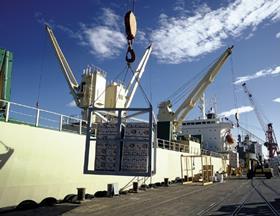
Freshfel Europe has this week released new figures showing key import trends for European Union member nations in 2009, with the value of fruit imports from third countries into the EU falling by 5.77 per cent year-on-year.
According to the data, gathered from Eurostat, imports into the EU in volume terms fell by 7.13 per cent last year to 11.1m tonnes, compared with the 11.9m tonnes imported in 2008.
'This data confirms the careful approach of EU importers in a year of a complex market situation, low prices on the EU market and stagnating consumption,' said Freshfel Europe president Ramon Rey.
Bananas remained top of the list in volume terms with over 4.5m tonnes imported, although this represented a drop of 7.46 per cent on 2008, while pineapples came in second with 880,000 tonnes imported.
'Altogether tropical fruit imports account for more than 50 per cent of the total fresh fruit imports, leaving the total volume of non-tropical imported products to represent today around 14 per cent of the total consumption on the EU market,' Mr Rey added.
While fruit imports declined, vegetable imports remained stable, increasing slightly by 0.45 per cent in volume and 1.45 per cent in value on 2008, adding up to a substantial 14.5 per cent volume increase compared with the five-year average.
The main trading partners for the EU in terms of fruit imports were banana suppliers, led by Costa Rica (13.4 per cent of the overall volume), Ecuador (12.4 per cent) and Colombia (11.2 per cent), as well as South Africa (9.6 per cent) and Chile (6 per cent).
Leading the way in vegetable imports were Mediterranean countries such as Morocco, which accounted for 33.2 per cent of volumes in 2009, Turkey (15 per cent), Israel (11 per cent) and Egypt (5.1 per cent).
'With more than 11m tonnes of imported fruit, worth over €8.8bn, and 1.8bn tonnes of vegetable imports worth some €1.7bn, these figures show the importance of the fruit and vegetable trade business as a complement to EU production,' said Freshfel general delegate Philippe Binard. 'This business provides European consumers with a wide choice of healthy and safe products of their choice all year round and from a wide diversity of origins both from within the EU-27 and from around the world.'



